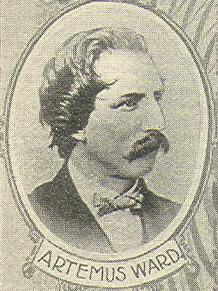Today, Splitsider has a piece by Micah Hofferth called “Charles Farrar Browne, the Sometimes-Racist Father of Standup Comedy.” As Hofferth explains, Browne was a “standup pioneer who shaped the invention of American comedy and became an international star.” He was even, reportedly, Abraham Lincoln’s favorite author. Because he was reportedly better on stage than on the page—and because his career was cut very short when he died of tuberculosis at the age of 33—he has since faded into obscurity, while his contemporary and admirer Mark Twain became perhaps the most important figure in the history of American humor. (Also, Twain wrote Huckleberry Finn, so that helped.)
Like Twain, Browne, who wrote and performed under the alter ego Artemus Ward, wrote about the early Mormons—and on this score, at least, he seems to have outperformed his better-known contemporary. Twain’s sojourn among the Mormons in Salt Lake City is described in Roughing It, a semi-fictional bit of travel writing for which Twain drew on his brother’s diary as well as his own memory (several years passed between his visit to Utah and his writing of the book) and imagination.
Browne, meanwhile, published Artemus Ward Among the Mormons in 1866, shortly after his own stay in Salt Lake. He contracted a form of typhoid while there, and was nursed back to health by a polygamous Mormon doctor; this seems to have softened his satirical take somewhat. In a letter to Twain, he wrote that “the saints have been wonderfully kind to me. I could not have been better or more tenderly nursed at home. God bless them all.”
But he could still be comical and irrevent when writing about these kind people. Comparing Brigham Young to Joseph Smith, Browne (as Artemus) writes, “Smith did a more flourishing business in the Prophet line than B.Y. does. Smith used to have his little Revelation almost every day—sometimes two before dinner. B.Y. only takes one once in a while.” This has the benefit of being not only irreverent but also accurate. When, in the next paragraph, Browne notes the “brass American eagle” on a gateway near Young’s home, and passes along the story that Young receives “his spiritual dispatches through this piece of patriotic poultry,” he’s careful to clarify that it’s the “anti-Mormons” who say this. (Then he shares a couple other of their funny stories.)
The Mormons were certainly objects of fun for Browne, but they were also—and somewhat unusually, for the time; two decades later, Arthur Conan Doyle depicted 19th-century Mormons as kidnappers and murderers in the first Sherlock Holmes mystery—objects of sympathy.
And happily, you can read Artemus Ward Among the Mormons in its entirety online.
